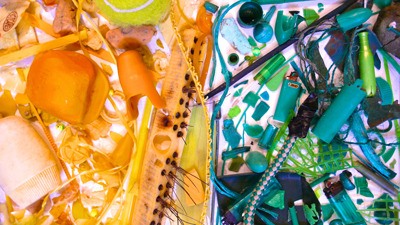Finding a message in a bottle washed up on shore sounds mysterious and charming, but that was before the invention of plastic.
The same currents that used to lure glass bottles to foreign lands are now carrying tons of plastic garbage.
When homeschooling moms, Liesl Clark and Rebecca Rockefeller, took their broods to the beach in early 2010, they stumbled on plastic debris washed up on shore. Once they started looking, tiny balls of styrofoam and bits of plastic in every color and shape imaginable seemed to be everywhere.
The group collected, then inventoried the plastic in a month-long study. Most of the refuse found in the “Plastic is Forever” study is from single-use disposable products, fireworks, and construction debris. Afterward, they used it to create colorful artwork as a way to draw attention to the problem that threatens the longterm health of the planet. Clark, a documentary filmmaker whose films have been aired on National Geographic, also created a documentary of the process, which can be viewed at www.biwatershedcouncil.org.
An exhibit of their artwork, “Plastic is Forever,” is on display in the foyer of Bainbridge Performing Arts, through August.
Rockefeller and Clark were the featured speakers at the July SWERV meeting July 9, where they spoke about the problem of plastics, not only washing up on shore, but spiraling in the North Pacific Central Gyre, a “garbage patch” of plastics believed to be twice the size of Texas.
Part of the problem with plastic is its durability. It never really goes away, but merely breaks up into smaller and smaller pieces called micro-plastics. Unfortunately for marine life, these microplastics mimic the look of zooplankton, the micro organisms upon which the aquatic food chain depends.
Plastic is forever, the exhibit isn’t
“Plastic is Forever,” an exhibit of colorful artwork created from plastic beach debris, is on display at Bainbridge Performing Arts through August.
For more information, visit www.biwatershedcouncil.org.



